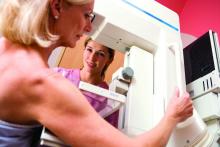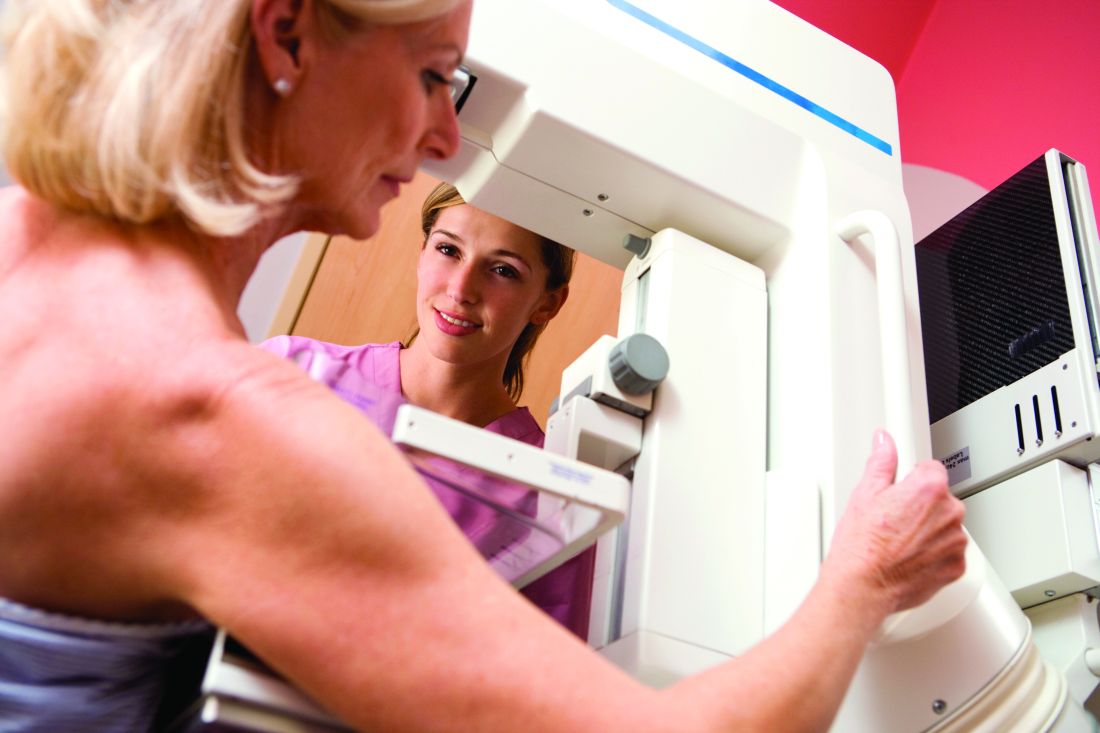User login
Primary care physicians tend to follow breast cancer screening recommendations from the American Congress of Obstetricians and Gynecologists, according to findings from a recent survey.
The American Congress of Obstetricians and Gynecologists (ACOG), the American Cancer Society (ACS), and the U.S. Preventive Services Task Force (USPSTF) offer conflicting guidelines on the optimal time to initiate and discontinue screening mammography, as well as the optimal screening interval. ACOG recommends annual screening for women aged 40 and older, while the ACS advises annual screening at age 45, and the USPSTF calls for biennial mammograms starting at age 50, though all three organizations stress individualized management.
There were 871 respondents, including family medicine/general practice physicians (44.2%), internists (29.7%), and gynecologists (26.1%). The average age of the respondents was 53 years, and more than half of them had been in practice for more than 20 years. A slight majority (55%) were men, and most (71%) were white.
A total of 26.0% of the respondents said they trusted ACOG screening guidelines the most, 23.8% said they trusted ACS guidelines, and 22.9% said they trusted USPSTF guidelines the most.
In total, 81% of physicians recommended screening to women aged 40-44 years, 88% recommended screening to women aged 45-49 years, and 67% recommended screening for women 75 years or older. Among physicians who recommended screening, most recommended annual exams.
These findings show that physicians differ sharply in their adherence to practice guidelines. The results also “provide an important benchmark as guidelines continue evolving, and underscore the need to delineate barriers and facilitators to implementing guidelines in clinical practice,” the researchers wrote.
Primary care physicians tend to follow breast cancer screening recommendations from the American Congress of Obstetricians and Gynecologists, according to findings from a recent survey.
The American Congress of Obstetricians and Gynecologists (ACOG), the American Cancer Society (ACS), and the U.S. Preventive Services Task Force (USPSTF) offer conflicting guidelines on the optimal time to initiate and discontinue screening mammography, as well as the optimal screening interval. ACOG recommends annual screening for women aged 40 and older, while the ACS advises annual screening at age 45, and the USPSTF calls for biennial mammograms starting at age 50, though all three organizations stress individualized management.
There were 871 respondents, including family medicine/general practice physicians (44.2%), internists (29.7%), and gynecologists (26.1%). The average age of the respondents was 53 years, and more than half of them had been in practice for more than 20 years. A slight majority (55%) were men, and most (71%) were white.
A total of 26.0% of the respondents said they trusted ACOG screening guidelines the most, 23.8% said they trusted ACS guidelines, and 22.9% said they trusted USPSTF guidelines the most.
In total, 81% of physicians recommended screening to women aged 40-44 years, 88% recommended screening to women aged 45-49 years, and 67% recommended screening for women 75 years or older. Among physicians who recommended screening, most recommended annual exams.
These findings show that physicians differ sharply in their adherence to practice guidelines. The results also “provide an important benchmark as guidelines continue evolving, and underscore the need to delineate barriers and facilitators to implementing guidelines in clinical practice,” the researchers wrote.
Primary care physicians tend to follow breast cancer screening recommendations from the American Congress of Obstetricians and Gynecologists, according to findings from a recent survey.
The American Congress of Obstetricians and Gynecologists (ACOG), the American Cancer Society (ACS), and the U.S. Preventive Services Task Force (USPSTF) offer conflicting guidelines on the optimal time to initiate and discontinue screening mammography, as well as the optimal screening interval. ACOG recommends annual screening for women aged 40 and older, while the ACS advises annual screening at age 45, and the USPSTF calls for biennial mammograms starting at age 50, though all three organizations stress individualized management.
There were 871 respondents, including family medicine/general practice physicians (44.2%), internists (29.7%), and gynecologists (26.1%). The average age of the respondents was 53 years, and more than half of them had been in practice for more than 20 years. A slight majority (55%) were men, and most (71%) were white.
A total of 26.0% of the respondents said they trusted ACOG screening guidelines the most, 23.8% said they trusted ACS guidelines, and 22.9% said they trusted USPSTF guidelines the most.
In total, 81% of physicians recommended screening to women aged 40-44 years, 88% recommended screening to women aged 45-49 years, and 67% recommended screening for women 75 years or older. Among physicians who recommended screening, most recommended annual exams.
These findings show that physicians differ sharply in their adherence to practice guidelines. The results also “provide an important benchmark as guidelines continue evolving, and underscore the need to delineate barriers and facilitators to implementing guidelines in clinical practice,” the researchers wrote.
FROM JAMA INTERNAL MEDICINE
Key clinical point:
Major finding: Across physicians groups, 81% of respondents recommended screening women aged 40-44 years.
Data source: An analysis of survey responses regarding breast cancer care from a nationally representative sample of 871 family/general medicine physicians, internists, and gynecologists.
Disclosures: The researchers reported having no conflicts of interest.

